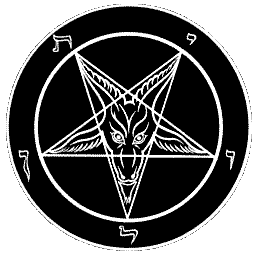The Church of Satan
| Church of Satan | |
|---|---|

Sigil of Baphomet, an official symbol of LaVeyan Satanism
|
|
| Type | New religious movement |
| Classification | Religious organization |
| Scripture | The Satanic Bible |
| Theology | LaVeyan Satanism |
| Governance | Priesthood |
| Structure | Cabal |
| High Priest | Peter H. Gilmore |
| Associations | Non-ecumenical |
| Region | International |
| Headquarters | Poughkeepsie, New York |
| Founder | Anton Szandor LaVey |
| Origin | April 30, 1966 The Black House, San Francisco, California |
| Other name(s) | The Satanic Church |
| Publications | The Black Flame, The Cloven Hoof |
| Official website | www |
The Church of Satan is an international organization dedicated to the religion of LaVeyan Satanism as codified in The Satanic Bible. The Church of Satan was established at the Black House in San Francisco, California, on Walpurgisnacht, April 30, 1966, by Anton Szandor LaVey, who was the church's until his death in 1997. In 2001, Peter H. Gilmore was appointed to the position of high priest, and the church's headquarters were moved to Hell's Kitchen, Manhattan, New York City.
The church does not believe in the Devil, nor a Christian or Islamic notion of Satan. High priest Peter Gilmore describes its members as "skeptical atheists", embracing the Hebrew root of the word "Satan" as "adversary". The church views Satan as a positive archetype who represents pride, individualism, and enlightenment, and as a symbol of defiance against the Abrahamic faiths which LaVey criticized for what he saw as the suppression of humanity's natural instincts.
The Church of Satan describes its structural basis as a cabal that is "an underground cell-system of individuals who share the basis of [our] philosophy". Membership to the Church of Satan is available on two levels: registered membership and active membership. Registered members are those who choose to affiliate on a formal level by filing out the required information and sending a one time registration fee. Active membership is available for those who wish to take a more active role in the organization, and is subject to the completion of a more comprehensive application. The church provides wedding, funeral, and baptismal services to members. Such ceremonies are performed by a member of the church's priesthood.
...
Wikipedia
